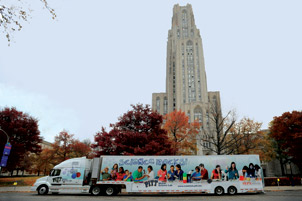Pitt-WQED Multimedia's 'Science Mission 101' to Premiere Nov. 12
 Pitt Mobile Science Lab
Pitt Mobile Science LabIn the search for America’s next generation of scientists, the University of Pittsburgh and WQED Multimedia have produced Science Mission 101, an educational, competitive reality television program wherein two teams of Pittsburgh-area high school students compete to unravel scientific mysteries. Aimed at reaching underserved middle-school students and accepted for national distribution by American Public Television (APT), the half-hour pilot of Science Mission 101 will premiere at 8 p.m. Nov. 12 on WQED-TV.
In the pilot episode, host Mike Lee challenges Team Awesome and Team Dominate to investigate whether amoebae like those found in our digestive systems prefer to eat specific types of bacteria—and whether that preference relates to the fact that only certain bacteria make people sick. The students expose an amoeba to different strains of the bacterium Salmonella—which is found in raw or undercooked food—to determine whether it prefers to eat one strain over the other. Students perform their work in laboratories within Pitt’s Department of Biological Sciences and on the Pitt Mobile Science Lab, a traveling laboratory outfitted with high-end equipment used to perform scientific investigations.
The Pitt Mobile Science Lab is a self-contained, fully equipped, traveling laboratory primarily used for the outreach programs in the Department of Biological Sciences. The 70-foot tractor-trailer was purchased in 2008 through a National Institutes of Health Clinical and Translational Science Award. It is sponsored by Pitt’s Clinical and Translational Sciences Institute and through the Science Education Partnership Awards given to the Department of Biological Sciences. Collaborative partners include the Pittsburgh Life Sciences Greenhouse, the Lyceum Group, Thermo Fisher Scientific, and the Pittsburgh Tissue Engineering Initiative.
The teams present their findings to judges from Pitt’s Department of Biological Sciences and are evaluated based on cooperation, creativity, interpretation of experimental data, presentation, and scientific thought. The judges are Alison Slinskey Legg, Mobile Science Lab director and director of outreach programs for the Department of Biological Sciences; Graham F. Hatfull, Eberly Family Professor and HHMI Professor and chair of the department; and Kristen Butela, a graduate student in the lab of Pitt biological sciences professor Jeffrey Lawrence.
Science Mission 101 will repeat at noon and 7:30 p.m. Nov. 15 and 4:30 p.m. Nov. 16. Additional resources for students and teachers will be available at www.sciencemission101.com by the time the show premieres. Funding to produce the pilot for Science Mission 101 was provided by the Pennsylvania Department of Education through the Pennsylvania Public Television Network (PPTN), PPG Industries Foundation, and the University of Pittsburgh.
Pitt’s Biological Sciences Outreach Program has supported local K-12 education for the past 15 years, providing professional teacher training workshops, hands-on science experiments for K-12 students, and an outreach education associate’s degree program that introduces graduate and undergraduate biology students to K-12 teaching (http://www.pitt.edu/~biology). Since 1995, Pitt has supplied high school science teachers with “Pitt Kits” that contain supplies to create and implement inquiry-based modules to teach their students throughout the year; the program has reached more than 33,000 students within a 50-mile radius of the University.
Other Stories From This Issue
On the Freedom Road

Follow a group of Pitt students on the Returning to the Roots of Civil Rights bus tour, a nine-day, 2,300-mile journey crisscrossing five states.
Day 1: The Awakening
Day 2: Deep Impressions
Day 3: Music, Montgomery, and More
Day 4: Looking Back, Looking Forward
Day 5: Learning to Remember
Day 6: The Mountaintop
Day 7: Slavery and Beyond
Day 8: Lessons to Bring Home
Day 9: Final Lessons

